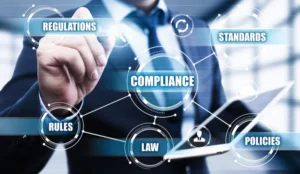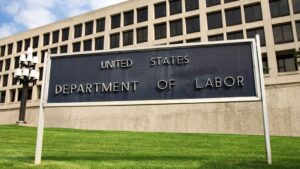Last year, the Biden administration announced an ambitious, two-part plan to boost the vaccination of American workers against COVID-19—the Large Employer and Healthcare Employer Vaccine mandates.
- The first part of the mandate, issued by the Occupational Safety and Health Administration (OSHA), applied to companies with over 100 employees. This included an estimated 84 million workers who have not yet received their first COVID-19 shot.
- The second part (Healthcare Employer Vaccine Mandate), from the U.S. Centers for Medicare and Medicaid Services (CMS), affected healthcare employers that accept Medicare and Medicaid.
Separate U.S. Supreme Court decisions
Both components of Biden’s plan were immediately met with legal challenges through various levels of the court system. Earlier this month, the U.S. Supreme Court reached a decision on both parts of the vaccine mandate—one against and one in favor.
- The U.S. Supreme Court issued a stay on OSHA’s COVID-19 vaccination emergency temporary standard for large employers.
- This means large employers (over 100 employees) do not have to proceed with their plans to comply with the rule requiring the shots or testing.
- Companies are free to institute their own mandates as long as such efforts don’t violate state and local laws.
- In a separate opinion, the Supreme Court dissolved all injunctions placed on the vaccination mandate for healthcare workers issued by the Centers for Medicare and Medicaid Services. This, ultimately, allows the Healthcare Employer Vaccine Mandate to move forward.
What do employers need to know about the Healthcare Employee Vaccine Mandate?
Here’s what healthcare employers need to know:
What employers does the Healthcare Employer Vaccine Mandate apply to?
The Court’s decision affects only healthcare employers that accept Medicare and Medicaid.
- The staff vaccination requirements apply to Medicare and Medicaid-certified provider supplier types that are regulated under the Medicare health and safety standards known as Conditions of Participation (CoPs), Conditions for Coverage (CfCs), or Requirements.
- This requirement does not apply to personal visitors such as family members or friends. However, it does apply to contractors that visit the facility on a regular basis.
What specific type of healthcare facilities are subject to the Healthcare Employer Vaccine Mandate?
The staff vaccination requirement applies to the following Medicare and Medicaid-certified
provider and supplier types:
- Ambulatory Surgery Centers
- Community Mental Health Centers
- Comprehensive Outpatient Rehabilitation Facilities
- Critical Access Hospitals
- End-Stage Renal Disease Facilities
- Health Clinics
- Home Health Agencies
- Home Infusion Therapy Suppliers
- Hospices
- Hospitals
- Intermediate Care Facilities for Individuals with Intellectual Disabilities
- Long-Term Care Facilities
- Providers of Outpatient Physical Therapy and Speech-Language Pathology Services
- Psychiatric Residential Treatment Facilities (PRTFs)
- Programs for All-Inclusive Care for the Elderly Organizations (PACE)
- Rehabilitation Agencies
- Rural Health Clinics/Medicare Federally Qualified Health Centers
What employees are subject to the Healthcare Employer Vaccine Mandate?
- Healthcare employers that accept Medicare and Medicaid need to have their employees vaccinated.
- All employees—regardless of clinical responsibility or patient contact—are subject to the mandate unless they obtain a medical or religious exemption.
- This includes facility employees, licensed practitioners, students, trainees, and volunteers.
- These requirements also apply to employees who work off-site from a formal clinical setting, such as in-home care, administrative offices, off-site meetings, etc.
What employees are NOT subject to the Healthcare Employer Vaccine Mandate?
- Exemptions can be granted for:
- Reasonable accommodation for a disability.
- Sincerely held religious belief, observance, or practice.
- Documented medical reasons, plus a statement from the authenticating practitioner.
- Employees who provide services 100% remotely and do not have any direct contact with patients and other staff.
- EMS providers that are not regulated by CMS health and safety standards.
- Some EMS providers may be subject to the vaccination requirements based on their professional relationship with a healthcare facility.
- Others not subject to the mandate:
- Religious Nonmedical Health Care Institutions (RNHCIs)
- Organ Procurement Organizations (OPOs)
- Portable X-Ray Suppliers
- Federally Qualified Health Centers (FQHCs) that do not participate in Medicare
What is the deadline for the Healthcare Employer Vaccine Mandate?
- Covered healthcare employees need to have:
- At least one shot by January 27.
- Those taking a two-shot series need to have the second by February 28.
- The CMS will grant 30-day and 60-day grace periods to providers that have 80% compliance from staff by the first deadline.
What does fully vaccinated mean in terms of this Healthcare Employer Vaccine Mandate?
- Fully vaccinated refers to employees who are two weeks or more since completing a primary vaccination series for COVID-19.
- Although the FDA has approved (and the CDC recommends) receiving a booster shot, a third short is not part of the primary vaccination series, therefore, not required by the mandate.
Which vaccines are approved for use by CMS?
Generally, employees must receive a vaccine licensed or authorized for emergency use by the
Food and Drug Administration (FDA)**, including:
- Pfizer-BioNTech COVID19 Vaccine
- Moderna COVID-19 Vaccine
- Janssen (Johnson & Johnson) COVID-19 Vaccine
** Employers are also allowed to accept a vaccine listed by the World Health Organization (WHO) for emergency use that is not approved or authorized by the FDA.
What documentation is required to show proof of vaccination?
Regulated facilities must have a process or plan in place for documenting and tracking staff vaccinations. Like all medical records, vaccine documentation must be kept confidential.
Acceptable forms of proof of vaccinations include:
- CDC COVID-19 vaccination record card (or legible photo of the card).
- Documentation of vaccination from a health care provider or electronic health record.
- State immunization information system record.
What are the penalties for failing to comply with the Healthcare Employer Vaccine Mandate?
- For nursing homes, home health agencies, and hospice, failure to comply includes civil monetary penalties, denial of payment, and even termination from the Medicare and Medicaid program as a final measure.
- The remedy for non-compliance among hospitals and certain other acute and continuing care providers is termination.
- Termination would generally occur only after providing a facility with an opportunity to make corrections and come into compliance.
For more information on the Healthcare Employer Vaccine Mandate, please visit the official FAQs released by CMS: https://www.cms.gov/files/document/cms-omnibus-covid-19-health-care-staff-vaccination-requirements-2021.pdf
Disclaimer: The opinions expressed are those of the author(s) and do not necessarily reflect the views of Netchex or its clients. This post is for general information purposes only and is not intended to be and should not be taken as legal advice.
Industry news & tips sent straight to your inbox!
Enter your email below to subscribe to industry news, product updates, and tips.
For more information on HR topics, read our HR blog and follow Netchex on social media—Facebook, LinkedIn, and Twitter.
Related articles

Overtime Overruled: 2024 Overtime Rule Vacated, Reverts to 2019 Threshold

HR Rules + Legislation Updates: Overtime, Non-Compete, Joint Employer, and More

HR Legislation: 2024 Updates to Independent Contractors and Joint Employer Rules

